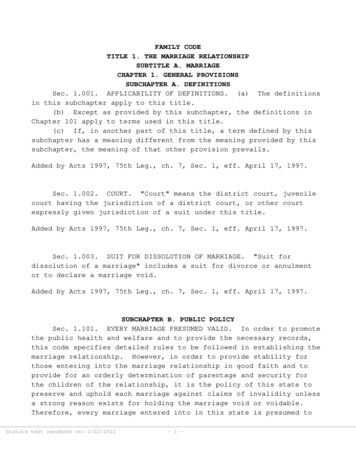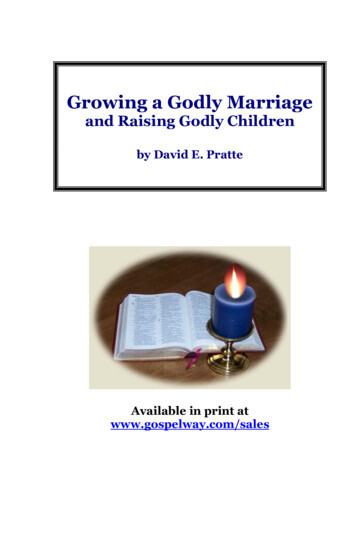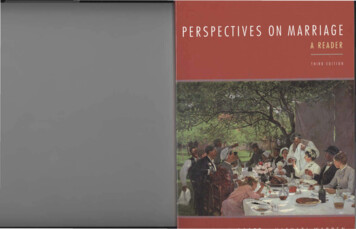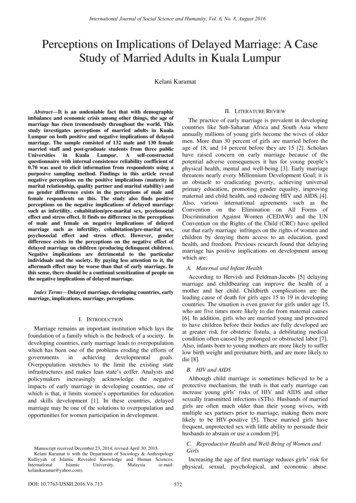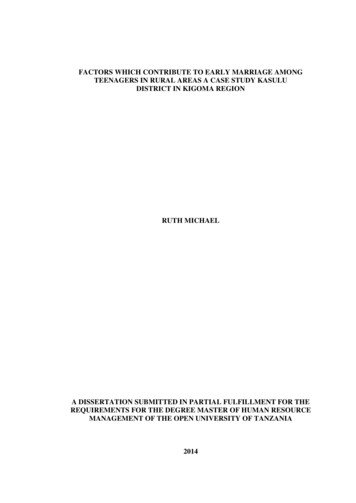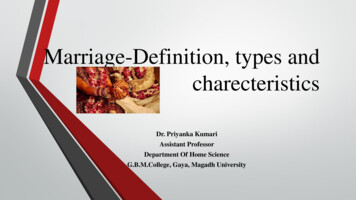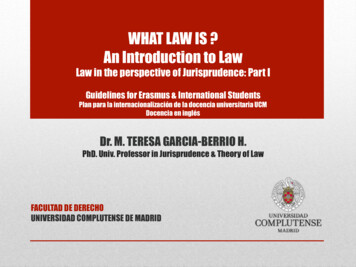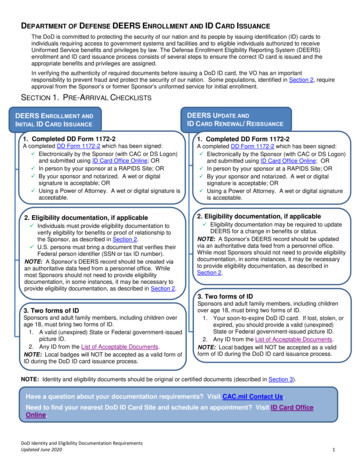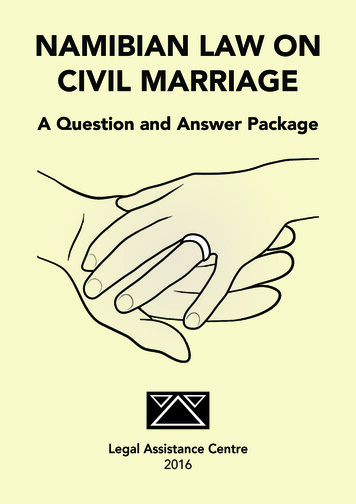
Transcription
NAMIBIAN LAW ONCIVIL MARRIAGEA Question and Answer PackageLegal Assistance Centre2016
This guide was funded by a grant from the United States Department of State.The opinions, findings and conclusions stated herein are those of the author anddo not necessarily reflect those of the United States Department of State.Text: Rachel Coomer and Dianne HubbardLayout: Perri CaplanPrinting: John Meinert Printing (Pty) LtdPublisher: Legal Assistance Centre Legal Assistance Centre, 20164 Marien Ngouabi Street(formerly named Körner Street)P.O. Box 604, Windhoek, NamibiaTel: 264-061-223356Fax: 264-061-234953Email: info@lac.org.naWebsite: www.lac.org.naAn electronic (pdf) version of this publication is posted on the LAC website.
CONTENTSINTRODUCTION . 11.BASIC REQUIREMENTS FOR MARRIAGE . 32.AUTOMATIC LEGAL CONSEQUENCES OFMARRIAGE . 93.HUSBANDS AND WIVES ARE EQUAL . 134.PROPERTY CONSEQUENCES OF MARRIAGE . 155.SPECIAL RULES ABOUT CERTAIN PROPERTY . 196.CHILDREN . 217.MAINTENANCE . 268.CONFLICT IN MARRIAGE:DOMESTIC VIOLENCE AND RAPE . 299.DIVORCE . 3310. INHERITANCE . 37
INTRODUCTIONThis booklet has been designed to assist marriage counsellors to inform couplesabout the basic legal issues associated with marriage. It may also be useful toother people who work with engaged and married couples.The booklet will also be helpful to couples who are thinking about getting married.Marriage is a demonstration of love, but it is also a legally-binding agreement.Marriage is a form of contract, and it is important that couples are aware of therights and duties that go with marriage.When a couple plan their wedding, the last thing they want to discuss is divorce,domestic violence or death. Every couple hopes that their marriage will last forever,but this is not always the case. So couples need to know at the outset what wouldhappen in the case of separation or divorce. Also, all marriages eventually endwhen one of the partners dies, and it is important to understand how death willaffect the surviving spouse.More detail about some of the issues discussed in this booklet can be found inother publications of the Legal Assistance Centre: Guide to the Married Persons Equality Act 1 of 1996 Guide to the Maintenance Act 9 of 2003 Guide to the Combating of Domestic Violence Act 4 of 2003.This booklet is about civil marriage. A civil marriage is a marriage that issolemnised by a marriage officer – which includes a magistrate or a religiousleader who has been certified as a marriage officer by the Ministry of HomeAffairs and Immigration. This booklet does not discuss customary marriage.2 NAMIBIAN LAW ON CIVIL MARRIAGE: A Question and Answer Package
1BASIC REQUIREMENTSFOR MARRIAGENamibian Constitution, Article 14, Family(1)Men and women of full age, without any limitation due to race,colour, ethnic origin, nationality, religion, creed or social or economicstatus shall have the right to marry and to found a family. They shallbe entitled to equal rights as to marriage, during marriage and at itsdissolution.(2)Marriage shall be entered into only with the free and full consent ofthe intending spouses.(3)The family is the natural and fundamental group unit of society andis entitled to protection by society and the State.“Spouse” is a gender-neutral word that refers to a husband or a wife.Who can get married?(1)Civil marriage can take place only between persons of the opposite sex.(2)Both the man and the woman must give free consent to the marriage.Consent is not valid if it is given as a result of intimidation or threats. It is notpossible for a person to consent to a marriage if that person does not havethe mental capacity to understand the nature of marriage.BASIC REQUIREMENTS FOR MARRIAGE 3
(3)One person at a time: Neither spouse can marry if he or she is already ina civil marriage with someone else.either party is divorced, they may be asked to show the divorce orderfrom the court before they can re-marry. If either party was married but the previous spouse has died, they may beasked to show the death certificate before they can re-marry. IfIf these papers cannot be produced, the person in question may be asked toprovide a sworn statement MENTWhat is the minimum age for marriage?Both the man and woman must be at least age 18 to give independent consent tomarry. If either of them is under age 18, then they must have written permissionfrom the Minister or a court in order to marry, as well as parental consent.A person who is under age 21 needs parental consent to marry.Where parental consent is required: If the parents are married, then both parents must consent. If the parents were never married, the parent who has guardianship mustgive consent. If the parents are divorced, the parent who has guardianship must giveconsent unless the divorce order says something different.If the marriage takes place without the required consents, it could be invalid.In such a case, the consequences would be similar to those of a divorce.4 NAMIBIAN LAW ON CIVIL MARRIAGE: A Question and Answer Package
POSSIBLE LAWREFORM ONPROCEDUREFOR CONSENTKey Rules onConsent to Marriage Achild below age 18 cannot be engagedto marry.As of early 2016,the Ministry ofHome Affairs andImmigration isconsidering a newlaw on marriagewhich might havesome provisions onparental consent. A child below age 18 cannot marry withoutconsent from the parents and the state. Aperson below age 21 cannot marrywithout parental consent. Givingout a child under age 18 in anengagement or marriage to which the childdoes not consent is illegal. The penalty isa fine of up to N 50 000 or imprisonmentfor up to 10 years, or both.Can family members marryeach other?Marriage is NOT allowed to take place between closefamily members.This includes close blood relatives. For example,a person can NOT marry his or her child, parent,grandparent, brother or sister, half-brother or halfsister, aunt or uncle, or niece or nephew.This also includes close relatives by marriage. Forexample, a person can NOT marry the grandparent,parent, child or grandchild of a dead or divorcedhusband or wife.This new law mayinclude a procedurefor dealing withconsent where aparent is dead,presumed dead,missing, outsideNamibia andimpossible tocontact or unableto give consentbecause of somemedical conditionor mental disability.The new law mayalso allow a personwho wants to marryto seek permissionto marry from acourt where a parentis unreasonablywithholding consent.BASIC REQUIREMENTS FOR MARRIAGE 5
PROHIBITED DEGREES OF FAMILY RELATIONSHIPA man may NOT marry his A woman may NOT marry her motherdaughteradoptive daughtersisterhalf-sistergrandmother (on his father’s or mother’s side)granddaughtergreat-granddaughterwife’s mother (his mother-in-law)wife’s daughter (his stepdaughter)father’s wife (his stepmother)son’s wife (his daughter-in-law)father’s father’s wife (his great-aunt)mother’s father’s wife (his great-aunt)wife’s father’s mother (his wife’s grandmother)wife’s mother’s mother (his wife’s grandmother)wife’s son’s daughter (his wife’s granddaughter)wife’s daughter’s daughter (his wife’s granddaughter)son’s son’s wife (his grandson’s wife)daughter’s son’s wife (his grandson’s wife)father’s sister (his aunt)mother’s sister (his aunt)brother’s daughter (his niece)brother’s daughter’s daughter (his grand-niece)brother’s son’s daughter (his grand-niece)sister’s daughter (his niece)sister’s daughter’s daughter (his grand-niece)sister’s son’s daughter (his grand-niece)fathersonadoptive sonbrotherhalf-brothergrandfather (on her father’s or mother’s side)grandsongreat-grandsonhusband’s father (her father-in-law)husband’s son (her stepson)mother’s husband (her stepfather)daughter’s husband (her son-in-law)father’s mother’s husband (her great-uncle)mother’s mother’s husband (her great-uncle)husband’s father’s father (her husband’s grandmother)husband’s mother’s father (her husband’s grandmother)husband’s son’s son (her husband’s grandson)husband’s daughter’s son (her husband’s grandson)son’s daughter’s husband (her grandson’s husband)daughter’s daughter’s husband (her grandson’s husband)father’s brother (her uncle)mother’s brother (her uncle)brother’s son (her nephew)brother’s son’s son (her grand-nephew)brother’s daughter’s daughter (her grand-nephew)sister’s son (her nephew)sister’s son’s son (her grand-nephew)sister’s daughter’s son (her grand-nephew)However it is acceptable for cousins to marry. It is also acceptable for a person tomarry their dead or divorced spouse’s brother or sister.ACCEPTABLE DEGREES OF FAMILY RELATIONSHIPA man MAY marry his mother’s sister’s daughter (his first cousin)mother’s brother’s daughter (his first cousin)father’s sister’s daughter (his first cousin)father’s brother’s daughter (his first cousin)former wife's sisterformer wife’s aunt6 A woman MAY marry her mother’s sister’s son (her first cousin)mother’s brother’s son (her first cousin)father’s sister’s son (her first cousin)father’s brother’s son (her first cousin)former husband's brotherformer husband’s uncleNAMIBIAN LAW ON CIVIL MARRIAGE: A Question and Answer Package
What facts must bedisclosed before themarriage takes place?Both parties must disclose any physicalproblems that would affect their abilityto engage in sexual intimacy or to havechildren. If these things are not disclosed,the spouse who was not informed couldapply to a court to have the marriagedeclared invalid. Ifeither person is at the time of themarriage permanently unable to havesexual intercourse for some physicalreason (such as impotence or theresults of some injury), this must bedisclosed. Ifeither person is at the time ofthe marriage physically unable toprocreate (in other words if the manis sterile or the woman is barren), thismust be disclosed.A woman who is pregnant by anotherman at the time of the marriage mustdisclose this to the man she intends tomarry. If this is not disclosed, the spousewho was not informed could apply toa court to have the marriage declaredvoid. Thereis no requirement that sexualrelations with other people beforethe marriage must be disclosed, onlypregnancy.Does a man who is intending tomarry similarly have to disclosethat another woman is pregnantwith his child at the time of themarriage?The law is silent on this. The rulesabout disclosing pregnancy datefrom a time when the law onmarriage included many instances ofsex discrimination. In light of modernprogress towards gender equality,a court might allow a wife to applyto cancel a marriage if the husbandhad failed to disclose that anotherwoman was pregnant with his child.Is there any duty to disclose theexistence of children alreadyborn to either spouse togetherwith other partners?The law does not address thisspecifically, other than to makeit possible to cancel marriagesif there has been some fraud byeither spouse. Disclosure of theexistence of any children with otherpartners is important, because thebiological parent will continue tohave a duty to contribute to themaintenance of such children untilthey are in a position to becomeself-supporting. All children areequal in the eyes of the law,whether they were born inside oroutside marriage, and they have anequal right to parental maintenancein accordance with their needs. Thiscould affect the marital finances.BASIC REQUIREMENTS FOR MARRIAGE 7
Marriage between a Namibian citizen and a non-Namibian citizenIf a Namibia citizen marries a non-Namibian citizen, does the non-Namibianspouse have a right to live in Namibia?If a non-Namibian enters a good faith marriage with a Namibian, the couple has aright to live in Namibia together. The non-Namibian spouse has the right to live andwork in Namibia.Is the non-Namibian spouse eligible for Namibian citizenship?A non-Namibian spouse is eligible for Namibian citizenship by marriage if he or shehas been living in Namibia with the Namibian spouse for at least ten years.The marriage must be in good faith, and not a false marriage entered into only forcitizenship purposes.What happens if the marriage ends because of death or divorce?The non-Namibian spouse has a right to continue living in Namibia if the Namibianspouse dies. The non-Namibian spouse has a right to continue living in Namibiaif the marriage ends in divorce after having lasted for at least two years.This rule ensures that a spouse does not have to stay in an unhappy or violentmarriage for fear of having to leave his or her home in Namibia.What law applies to marital property when a Namibian citizen marries anon-Namibian citizen?Namibian law says that the property consequences of a marriage follow the lawof the country where the husband made his home at the time the marriage tookplace. Couples who will be affected by this rule should find out about the propertyconsequences that will apply to them before they get married. They can make anante-nuptial agreement which chooses a law other than that of the husband’s homecountry to govern the property of the marriage, but this must be done before themarriage takes place.As of early 2016, the government is considering law reform on marriages betweenNamibian citizens and non-Namibian citizens, because of the problem of bad-faithmarriages – meaning marriages that are not real marriages, but are entered into justso the non-Namibian citizen can live and work in Namibia. Sometimes the Namibianspouse may think that the marriage is real while the non-Namibian spouse is justtaking advantage.8 NAMIBIAN LAW ON CIVIL MARRIAGE: A Question and Answer Package
2AUTOMATICLEGAL CONSEQUENCESOF MARRIAGEWhat is the legal definition of marriage?The legal definition of civil marriage is a voluntary union between one man andone woman for life, to the exclusion of all others.A marriage is a legal contract between a man and a woman. A marriage createsrights and duties for each partner. When two people get married, they agree tocertain things. They agree to live together as husband and wife. They agree to be faithful to each other, and not to have sexual relations withanyone else. They agree to support each other financially.A marriage creates what thelaw refers to as a “partnershipof life”. This has been describedas including companionship,love, affection, comfort, mutualservices and sexual relations.It has also been described asincluding loyalty, sympatheticcare and affection, concern,physical care, financial supportand services in the running ofthe common household.MARRIAGE IS A “PARTNERSHIP OF LIFE”AUTOMATIC LEGAL CONSEQUENCES OF MARRIAGE 9
What are the automatic rights and duties ofhusband and wife?Every civil marriage has certain rights and duties which cannot be changed.1)Living together as husband and wifeA husband and wife are expected to live together. They are expected to havea sexual relationship with each other, and not with anyone else.The husband and wife cannot change these duties, even if they make anantenuptial contract. These duties are part of the basic concept of marriage.If either of the spouses does not carry out these duties, this would be groundsfor divorce. (If the spouses were in agreement about living apart for sometime – such as where one of them wants to work or study in a different placefor some time – then neither of them would seek divorce on this basis.)The Right to Say “NO”The fact that marriage includes an expectation of a sexual relationshipin general does NOT mean that one party can force the other tohave sexual relations on any specific occasion. Where force is used,a husband or wife can be charged with rape. If there is no sexualrelationship at all, the solution is not force but divorce.You have committeda terrible crime.Marriage or anyother relationship isnot a defence to acharge of rape. Forthis crime, I am givingyou a sentence of10 years in prison.10 NAMIBIAN LAW ON CIVIL MARRIAGE: A Question and Answer Package
2)Mutual duty of supportThe husband and wifehave a mutual duty ofsupport. This means thatthey are both expectedto make contributions tothe common household.These contributions can bein money or services – suchas where one spouse worksoutside the home and theother takes primary responsibility for housework and childcare.The husband and wife cannot change this mutualduty of support, even if they make an ante-nuptialcontract. It is part of the basic concept of marriage.MAINTENANCEORDERIf one spouse is not contributing to the commonhousehold, the wronged spouse could seek a maintenance order. Extreme cases might even be considereddomestic violence, in the form of economic abuse.3)FaithfulnessMarriage automatically includes a promise to be sexually faithful. This dutyapplies equally to both husband and wife.The husband and wife cannot change this duty. It is part of the basic conceptof marriage, even if they make an ante-nuptial contract.If the husband or wife commits adultery,this is a ground for divorce. Namibian lawalso makes it possible for the wrongedspouse to ask a lawyer to bring a lawsuitagainst the third party claiming money fordamages.Adultery is not a crime.The police cannot doanything in cases ofadultery.AUTOMATIC LEGAL CONSEQUENCES OF MARRIAGE 11
What are the rules on surnames after marriage?A wife can continue to use her own surname after marriage if she wishes. Alternatively,she may take her husband’s surname without any special procedures. She mustsimply start using his surname consistently after the marriage. (The law does notsay anything about using a hyphenated surname combining their two surnames.)In such a case, she is also allowed to resume her former surname without anyspecial procedures if the marriage ends because of divorce or death.A woman who changes the name she uses in practice must make the same changeon her Namibian identification card. It is a criminal offence to use a name that isdifferent to the one shown on the identification card.If the husband wants to take his wife’s surname or a hyphenated surname combiningtheir two surnames, he must go through a formal name change procedure whichinvolves extra effort and expense.Sex Discrimination in the Rules on SurnamesIn 2002, the United Nations Human Rights Committee which oversees theInternational Covenant on Civil and Political Rights signed by Namibiasaid that having different rules on married surnames for men and womenis unfair sex discrimination – even though most men in Namibia do notwant to take their wives’ surnames. The Committee said that the Namibiangovernment must make the law on surnames gender-neutral within 90 days,but as of January 2016, that law has not yet been changed.As of 2016, the Ministry of Home Affairs and Immigration is considering anew law on the registration of marriages and divorces. This law may includenew rules about the surnames husbands and wives can use after marriage,and new rules about resuming former surnames when the marriage ends.12 NAMIBIAN LAW ON CIVIL MARRIAGE: A Question and Answer Package
3HUSBANDS AND WIVESARE EQUALWhat does the law say about equality in marriage?At Independence, Namibia inheriteda concept called “marital power”which was part of the South Africanlaw on civil marriage. Marital powermeant that a wife was treated like achild in the eyes of the law. It meantthat she could not do many thingswithout her husband’s permission.She could not bring a case to court.She could not buy and sell property.She could not sign a contract. Shecould not take out a loan. She couldnot be the director of a company orthe trustee of a trust. But a husbandcould do all of these things withoutpermission from his wife.Marital power also meant that the husband controlled all of theproperty of the marriage, whether it was property that the coupleowned jointly or the separate property of the husband or the wife.The Married Person’s Equality Act repealed marital power andbrought Namibian marriage law in line with the Constitution.This Act makes it clear that husbands and wives have equal rightsand powers in civil marriage. The Married Person’s Equality Actapplies to all civil marriage, even marriages that took place beforeIndependence or before the statute was talpower!HUSBANDS AND WIVES ARE EQUAL 13
The repeal of marital power means that husbands and wives now have equalpower to do the following things independently: enter into contracts take out loans bring or defend court cases register land in their own names administer money and property be a company director or a trustee.If the husband and wife are equal, who is thehead of the household?The Married Persons Equality Act says that the law will no longer recognise thehusband as the head of the household.Before the Married Persons Equality Act, the legal position was that the husbandhad the final say on all important family decisions, such as where and how thecouple would live. If the husband and wife had a dispute, the law said that thehusband would be the winner because he was the legal “head of household”.The Act repealed this legal rule. This means that families are now free to decideamongst themselves how they will handle family decision-making. If the familywants to treat the husband or the wife as the head of the household, or to makedecisions by consensus, this is their own private business. Couples can still turn toreligion, tradition or other values for guidance on the roles of husband and wife.But the law no longer favours the husband.In ourhousehold,my husbandmakes finaldecisions onsome matterssand I have theefinal say onother issues.Does the lawallow this?14 NAMIBIAN LAW ON CIVIL MARRIAGE: A Question and Answer PackageThe law does not tell people howto run their private lives. Husbandsaand wives in a marriage may haveddifferent roles and different waysoof sharing decision-making in theirddaily lives. But in the eyes of thellaw, husband and wife haveequal rights and powerseaand this must be respected foralla important financial matters.
4PROPERTY CONSEQUENCESOF MARRIAGEWhat happens to theproperty of the husbandand wife when theyget married?When people marry, this has an effecton their property. In Namibia, thereare three standard marital propertyregimes. Couples can also make otherarrangements if they wish.1)IN community of propertyThree Marital Property RegimesINcommunityof propertyHERS HISHER SHER S HISHISOUT ofcommunityof propertyACCRUALIN community of property: All assets and debts are shared.Everything that belonged to the husband before the marriage and everythingthat belonged to the wife before the marriage becomes part of the joint estate.HUSBANDS AND WIVES ARE EQUAL 15
Any money earned by either of them during themarriage becomes part of the joint estate. Anythingthey buy during the marriage is part of the jointestate, no matter who actually paid for it. The moneyand property in the joint estate can be used to payloans or debts of either spouse.The husband and the wife are equal partners inmanaging the joint estate while the marriage lasts.They must agree on all major transactions whichaffect the joint estate – such as transactions involvingland, livestock, investments, loans, hire-purchaseagreements, furniture and other major householditems. However, if either spouse has a business, thatspouse can do normal business transactions withoutthe other spouse’s consent.When the marriage comes to an end because ofdivorce or death, the joint estate is divided equallybetween husband and wife.2)Communityof propertyis a universaleconomicpartnershipof the spouses.All their assetsand liabilitiesare merged ina joint estate.They sharethis estateequally,regardlessof theirrespectivefinancialcontributions.OUT of community of propertyOUT of communityOof property:Assets and debtsstay separate.NNothing is shared.The husband and the wife keep their property and debts separate. Everythingthat belonged to the husband before the marriage remains his, and everythingthat belonged to the wife before the marriage remains hers.16 NAMIBIAN LAW ON CIVIL MARRIAGE: A Question and Answer Package
They each keep their own earnings. Everything the husband buys during themarriage is his, and everything the wife buys during the marriage is hers. Thehusband and the wife are responsible for their own loans and debts. Theydo not need each other’s consent for transactions with their own separateproperty.When the marriage comes to an end, the husband and the wife each keeptheir own separate belongings.3)Accrual (out of community of property with profit sharing)The husband and the wife keep their property and debts separate during themarriage, but increases in the value of their property are shared.During the marriage, the husband and the wife each have control over theirseparate money and property. They do not need each other’s consent fortransactions.When the marriage comes to an end, the husband and the wife will shareequally in the increases to their property since the marriage began. In orderto measure the increases correctly, both spouses must state the value of theproperty they own before the marriage takes place.HER SHISACCURAL: Assets and debts stay separate during the marriage.Increases to the assets of either spouse during the marriageare shared equally when the marriage comes to an end.HUSBANDS AND WIVES ARE EQUAL 17
What marital property regimewill apply?As a legacy of apartheid, different property regimes applyautomatically, depending on the race of the couple andwhere they live.All civil marriages between blacks north of the old “PoliceZone” are automatically out of community of property.To have a different marital property regime, a couple inthis category must make a declaration before a magistratewithin one month before the marriage takes place.All other civil marriages are automatically in communityof property. To have a different marital property regime,the couple must sign an ante-nuptial contract before themarriage takes place. They will need to get a lawyer tohelp them make this contract.Any couple can make an agreement about how theirmarriage will affect their property, if they follow theproper procedures and finalise the agreement beforethe marriage takes place.Couples do not have to choose one of the three standardmarital property regimes. They can make a differentarrangement about how their property will be shared.For example, they might decide to share everythingEXCEPT inheritances or a specific piece of land thathas been in one of their families for a long time.Can a marital property regime bechanged after marriage?No. It is almost impossible to make a change after themarriage, unless there has been some mistake. So itis important for a couple to consider their decision onproperty-sharing carefully before they get married.18 NAMIBIAN LAW ON CIVIL MARRIAGE: A Question and Answer PackagePOSSIBLELAW REFORMSON MARITALPROPERTYREGIMESThe Law Reformand DevelopmentCommissionis consideringpossible reformsto the system ofmarital propertyregimes.The race-basedsystem now inplace is almostcertainly a violationof the principleof equality inthe NamibianConstitution andwill eventuallybe repealedor changed bythe courts.It is also possiblethat the law mightbe reformed toallow a coupleto change theirmarital propertyregime after themarriage, if theyare in agreementabout this and ifprocedures arefollowed to protecttheir creditors.
5SPECIAL RULES ABOUTCERTAIN PROPERTYAre there any rules about property that apply to allmarriages, regardless of the marital property regime?Yes. Both spouses have a right to live in the matrimonial home and to use its basiccontents. Both spouses have a duty to help maintain the matrimonial home and tocontribute to basic household necessities.1)Right to live in the matrimonial homeNo matter what marital propertyregime applies to the marriage,both spouses have a right tolive in the matrimonial home– no matter who owns or rents it.Neither the husband nor the wife can evict eachother from the matrimonial home,, unless they providesuitable alternative accommodation.n.Both spouses have a correspondingngduty to contribute to the upkeep ofthe matrimonial home.We will be able topaint the houseand fix the fence ifwe both contributemoney and labour.The place where a husband and wife live together is the “matrimonial home”.Both spouses have a right to live in the matrimonial home, no matter who owns it or rents it,and both have a right to use its basic contents. Both spouses also have a duty to helpmaintain the matrimonial home and to contribute to basic household necessities.SPECIAL RULES ABOUT CERTAIN PROPERTY 19
2)Right to use the contents of the matrimonial homeA similar principle applies to the basic contents of the matrimonial home,such as the furniture and appliances.Losing Rights Through ViolenceThe right to live in the matrimonial home and to use its basic contentscan be overruled by a protection order or an order of the High Courtin a case where there is domestic violence.3)Necessities for the joint householdBoth spouses have a responsibility to contribute to household necessities– such as groceries, water and electricity. If the spouses are married incommunity of property, the costs of household necessities should come outof the joint estate. If they are married out of community of property or underthe accrual system, both must contribute a fair share to the costs of householdnecessities in light of their respective financial positions. If only one spousehas an
4 NAMIBIAN LAW ON CIVIL MARRIAGE: A Question and Answer Package (3) One person at a time: Neither spouse can marry if he or she is already in a civil marriage with someone else. If either party is divorced, they may be asked to show the divorce order from the court before they can re-marry.
